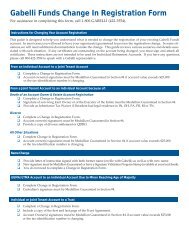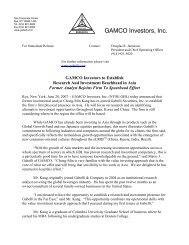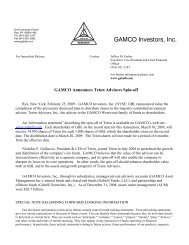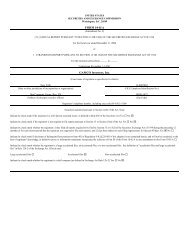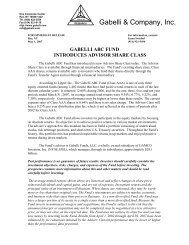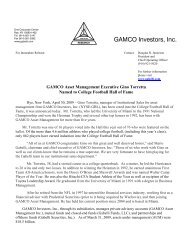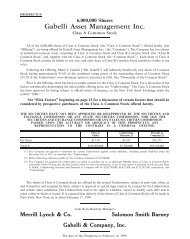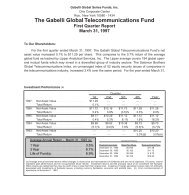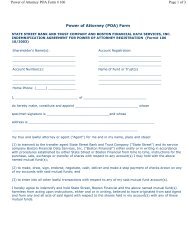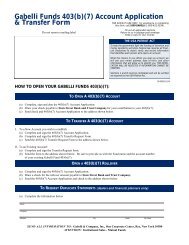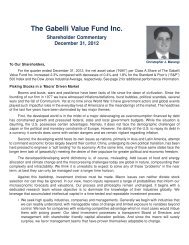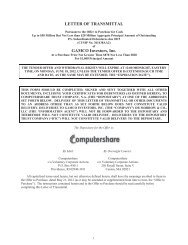Statement of Additional Info - Gabelli
Statement of Additional Info - Gabelli
Statement of Additional Info - Gabelli
You also want an ePaper? Increase the reach of your titles
YUMPU automatically turns print PDFs into web optimized ePapers that Google loves.
Board and Teton Advisors, Inc. (the "Adviser") and Westwood Management Corp. (“Westwood” or the “Sub-Adviser”) ,<br />
if unrated, are in the Adviser's opinion comparable in quality to rated corporate debt securities in which each Fund may<br />
invest. The rate <strong>of</strong> return or return <strong>of</strong> principal on some debt obligations in which the Funds may invest may be linked or<br />
indexed to the level <strong>of</strong> exchange rates between the U.S. dollar and a foreign currency or currencies.<br />
The Equity Fund, SmallCap Equity Fund, and Mid-Cap Equity Fund may invest, in normal circumstances, up to 20%,<br />
and Mighty Mites Fund, up to 35%, <strong>of</strong> their respective total assets in U.S. dollar- and foreign currency-denominated debt<br />
securities <strong>of</strong> domestic and foreign issuers, which are rated at least "BBB" by Standard & Poor's Ratings Services<br />
("S&P"), a division <strong>of</strong> McGraw Hill Companies, Inc. or "Baa" by Moody's Investors Service, Inc. ("Moody's") (except<br />
with respect to investments in commercial paper which will consist only <strong>of</strong> direct obligations that at the time <strong>of</strong> purchase<br />
are rated in the highest rating category by Moody's or S&P) or, if unrated, are determined to be <strong>of</strong> comparable quality by<br />
the Adviser, or in index options when it is believed they hold less risk or greater potential for capital appreciation than<br />
equity securities. Such investments are made without regard to the remaining maturities <strong>of</strong> such securities. (Investment<br />
grade debt securities are those which are rated at least "BBB" by S&P or "Baa" by Moody's). The Mid-Cap Equity Fund<br />
and Equity Fund may invest up to 10% <strong>of</strong> its total assets in debt securities (other than commercial paper) that are rated<br />
below investment grade or, if unrated, determined to be below investment grade. These investments generally carry a<br />
high degree <strong>of</strong> risk and are sometimes referred to as "high yield, high risk" securities by the investment community (see<br />
"Lower Rated Securities" below for more complete information). The Mid-Cap Equity Fund and Equity Fund will not<br />
invest in below investment grade securities which are rated below "C" by S&P or Moody's.<br />
Debt securities rated "BBB" by S&P or "Baa" by Moody's are considered medium grade obligations. Securities rated<br />
"Baa" by Moody's lack outstanding investment characteristics and in fact have speculative characteristics as well, while<br />
those rated "BBB" by S&P are regarded as having an adequate capacity to pay principal and interest. Securities rated in<br />
these categories are generally more sensitive to economic changes than higher rated securities. See the "Appendix" in<br />
this SAI for more details on the ratings <strong>of</strong> Moody's and S&P.<br />
Lower Rated Securities (All Funds). Debt securities rated lower than investment grade involve much greater risk <strong>of</strong><br />
principal and income, and <strong>of</strong>ten involve greater volatility <strong>of</strong> price, than securities in the higher rating categories. They<br />
are also subject to greater credit risks (including, without limitation, the possibility <strong>of</strong> default by or bankruptcy <strong>of</strong> the<br />
issuers <strong>of</strong> such securities) than securities in higher rating categories. In this connection, there have been recent instances<br />
<strong>of</strong> such defaults and bankruptcies which were not foreseen by the financial and investment communities. The lower<br />
quality and unrated obligations in which the Funds may invest will have speculative characteristics in varying degrees.<br />
While such obligations may have some quality and protective characteristics, these characteristics can be expected to be<br />
<strong>of</strong>fset or outweighted by large uncertainties or major risk exposures to adverse conditions. The value <strong>of</strong> such obligations<br />
may be more susceptible to real and perceived adverse economic or industry conditions than is the case <strong>of</strong> higher rated<br />
securities. The Funds are dependent on the Adviser's and the Sub-Adviser’s judgment, analysis, and experience in the<br />
evaluation <strong>of</strong> high yield obligations. In evaluating the creditworthiness <strong>of</strong> a particular issue, whether rated or unrated, the<br />
Adviser and the Sub-Adviser will normally take into consideration, among other things, the issuer's financial resources,<br />
its sensitivity to economic conditions and trends, the operating history <strong>of</strong> the issuer, the ability <strong>of</strong> the issuer's<br />
management, and regulatory matters. The Adviser and the Sub-Adviser will attempt to reduce the risks <strong>of</strong> investing in<br />
lower rated or unrated obligations through active portfolio management, diversification, credit analysis, and attention to<br />
current developments and trends in the economy and the financial markets. The Funds will also take such action as they<br />
consider appropriate in the event <strong>of</strong> anticipated financial difficulties, default, or bankruptcy <strong>of</strong> the issuers <strong>of</strong> any such<br />
obligation.<br />
Variable and Floating Rate Demand and Master Demand Notes (All Funds). A Fund may, from time to time, buy<br />
variable or floating rate demand notes issued by corporations, bank holding companies, and financial institutions, and<br />
similar taxable and tax exempt instruments issued by government agencies and instrumentalities. These securities will<br />
typically have a maturity longer than one year but carry with them the right <strong>of</strong> the holder to put the securities to a<br />
remarketing agent or other entity at designated time intervals and on specified notice. The obligation <strong>of</strong> the issuer <strong>of</strong> the<br />
put to repurchase the securities may be backed up by a letter <strong>of</strong> credit or other obligation issued by a financial institution.<br />
The purchase price is ordinarily par plus accrued and unpaid interest. Generally, the remarketing agent will adjust the<br />
interest rate every seven days (or at other specified intervals) in order to maintain the interest rate at the prevailing rate<br />
for securities with a seven-day or other designated maturity. A Fund's investment in demand instruments which provide<br />
that the Fund will not receive the principal note amount within seven days' notice, in combination with the Fund's other<br />
investments which are not readily marketable, will be limited to an aggregate total <strong>of</strong> 10% <strong>of</strong> that Fund's net assets.<br />
6




